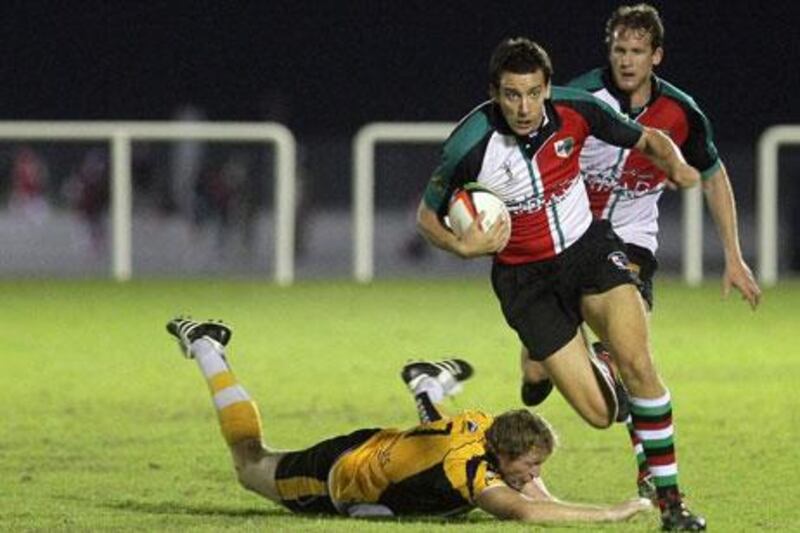The amateur players who make up the national team might be forgiven for feeling a certain amount of trepidation when they switch off their computers and leave the office at the end of this working week.
The prospect of playing against the code's leading players in front of 40,000 people must be as daunting as it is exciting, especially for one of the youngest sides ever to have represented this region.
Happily for the UAE, they will have a reassuring presence directing operations at this weekend's Emirates Airline Dubai Rugby Sevens.
Murray Strang is not likely to be cowed by running out in front of the teeming Sevens crowd, having played in cup finals at Murrayfield for the Glasgow Hawks.
Such a stage befits the talents of the country's leading fly-half. He might have played the game professionally in his native Scotland, but chose a career as a chartered surveyor, which brought him to the UAE, instead.
"I love my job," the Abu Dhabi Harlequins No 10 said. "I have lots of friends who do professional rugby, but I enjoy my office job and I love the social side of rugby.
"It is very competitive in Scotland. When you have two pro clubs to shoot for, I was competing with [the Scotland internationals] Dan Parks at Glasgow and Phil Godman at Edinburgh, and then a young crop behind that.
"With rugby being professional, if you come out of school knowing what you want to do straight away you have a head start."
If anyone was a cast iron guaranteed national team player in waiting as soon as they first stepped off the plane in the UAE, it was Strang.
Before arriving in the country, he played eight seasons in Scotland's Premier One competition, winning it three times with Glasgow, and played for the league select XV in internationals against Ireland.
He seemed destined to play representative rugby as soon as he reached the three-year residency qualification earlier this year, but then a succession of injuries nearly scuppered his chances.
He has only played a full 80 minutes twice in 2011, but he has returned to full fitness just in time for the Sevens and the ensuing Emirates Cup of Nations, a four-team competition involving the UAE, Hong Kong, Kenya and Brazil.
"It is an exciting time coming up," Strang said. "With UAE sevens training and XVs training, Abu Dhabi matches and hitting 30, I do get a lot of niggles.
"Having played 13 seasons on the trot, and the rest, you start to notice lack of rest when you get to this end of your career. It is an exciting time for the UAE in their second season and it is great to be a part of it."
His return to fitness has coincided with Abu Dhabi climbing the Gulf Top Six table in the domestic game, and Chris Davies, the club's director of rugby, says Strang's leadership qualities have been key to their resurgence.
"He's an influential character on the field and off it," Davies said. "He is a good leader and keeps us on the front foot, which is important to us as a team to help us play the style we do."
Strang's eligibility for national selection has also provided an answer in a position which has seemingly forever been a problem for the representative side.
In the final years in its guise as the Arabian Gulf, the side were never able to call on a specialist fly-half, with the rugby league convert Luke Sinclair and Duncan Murray, an inside centre, being tried there during the Asian Five Nations.
For last season's Five Nations, Jon Grady, the Jebel Ali Dragon, who expressed a preference for playing at centre, was handed the No 10 shirt. Wayne Marsters, the national team coach, said Strang's skill for manoeuvring his side around the field will be even more crucial in the abbreviated format.
"In the past we have suffered through not having a specialist first receiver," said Marsters, who is a former player and coach for the Arabian Gulf.
"Murray is really good at directing people around the park. He is very good at scanning the situation and assessing what is going on, which is really important in sevens, then giving us direction.
"He has the ability to make calls a lot earlier than we have managed in the past, so the players have been able to get into position sooner."
Follow us
[ @SprtNationalUAE ]






